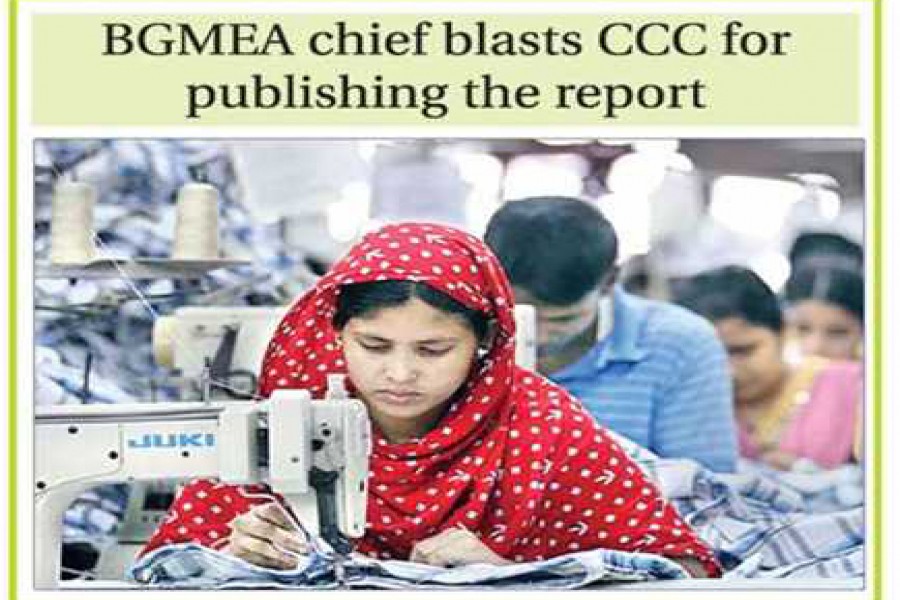
Published :
Updated :

Bangladesh's garment workers lost an estimated US$ 501 million or 29.5 per cent of their total monthly wages during a period from March to May amid the coronavirus pandemic, according to a latest global report.
Across South and Southeast Asia, it showed, the garment workers have received 38 per cent less than their regular income while in some regions in India, the figure rises to over 50 per cent.
The report showed that the loss of income globally would range between US$ 3.19 billion and $5.79 billion in the months of March, April and May, according to the report.
However, the estimates excluded countries such as China that took better measures to cover the wage gap.
The report titled 'Under Paid in the Pandemic: An estimate of what the garment industry owes its workers' by Clean Clothes Campaign (CCC), a global rights group, was launched on Monday.
It analysed nonpayment of wages to garment workers during the months of March, April and May resulting from order cancellations by apparel brands, unpaid leave, and state-sanctioned wage cuts during the Covid-19 crisis.
The report analysed seven garment manufacturing countries that included Bangladesh, Cambodia, India, Indonesia, Myanmar, Pakistan and Sri Lanka, and excluded China and Vietnam.
Citing industry figures, the CCC estimated that some 4,500 garment factories across Bangladesh employ around 4.4 million workers.
Minimum monthly wage of a garment worker in Bangladesh is TK 8,000 while a worker on average takes home Tk 9,580 or US$ 112 at the end of the month.
This brings the combined monthly wage of all workers to Tk 42.15 billion or approximately $ 496 million.
The report said that unlike the garment industries in countries like China, Cambodia, and Myanmar, Bangladesh remained largely unaffected by the Covid-19 pandemic in February, and the factories remained open as brand orders continued.
There were, however, disruptions in arrival of raw materials from abroad.
Things changed rapidly in March, however, when brands started cancelling orders at a high pace and until March 23, reportedly $ 1.5 billion of orders had been cancelled. In March, at least 150 factories closed temporarily, the report said.
The CCC estimated a total of 0.147 million workers did not receive any wages, while the remaining 4.2 million got only Tk 8,622 or $101 on an average.
"In consequence, the wage gap at the end of March would already be Tk 5.48 billion or $ 64.5 million."
In April, the report estimated that garment employers could, on average, only afford to pay 90 per cent of normal wages followed by lockdown, reopening of factories and government's announced Tk 500 billion stimulus package for paying export-oriented factories' workers.
Following the assumptions, the CCC concluded that in April, a total of Tk 22.86 billion or US$ 269.12 million in salaries was paid.
According to its estimate, the wage gap in April was $ 226.95 million.
Many small and medium-sized enterprises that worked as subcontractors for big factories and factories that announced layoffs have been unable to qualify for funding due to its conditions and, as a result, are unable to pay their workers, it explained.
Due to the government's regulation in April, most likely workers in closed factories received no wages, workers in factories under lockdown generally received 65 per cent and workers in factories without government support received nothing.
Workers who continued to go to the factory often also did not receive full wages, due to cancelled orders, which by April had risen to $3 billion.
Under influence of the combination of the lockdown and cancelled orders, the wage situation for workers escalated in April. An astonishing 580 factories closed, while 2,203 factories remained in lockdown.
The report, in May, estimated that half of the 580 closed factories as well as factories that were in lockdown during March and April reopened again and more went back to work.
It is estimated that 4,210 factories employing around 4.1 million were in operation in May.
Citing data, it said wage payments increased substantially in May; therefore workers working in May received 80 per cent of their average wages. In May, 80 per cent workers received their bonus though not in full but on average roughly 80 per cent of the bonus.
According to its estimation, the gap including bonus stood at $ 209.90 million--$ 124.75 million as wage and $ 85.15 million as bonus.
"In sum, we estimate the wage gap for the months of March to May including (Eid bonus) was around $ 501 million," the CCC report said.
When asked, BGMEA president Dr Rubana Huq said: "It's absolutely blasphemous to publish such a report when the ultimate responsibility was with the buyers."
So, instead of doing a report based on manufacturing countries, the report should have been based on the sourcing areas. That was the report with having credibility, she added.
"Besides, Bangladesh paid $ 534 million for the days when the workers didn't work in April, whereas all other countries followed no work no pay," she noted.
"So, it was a poor reflection of what they stand for," she said, adding the idea should not be to malign the manufacturers, but to get to the root causes. "And the root problems certainly does not lie at our end," she noted.


 For all latest news, follow The Financial Express Google News channel.
For all latest news, follow The Financial Express Google News channel.